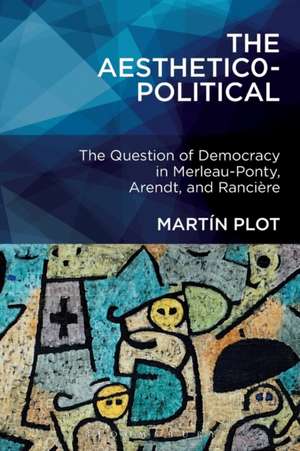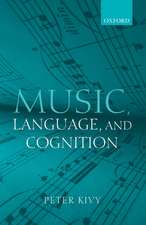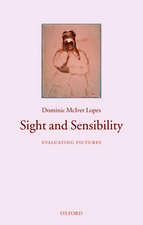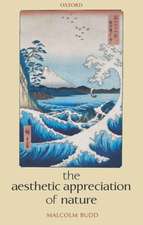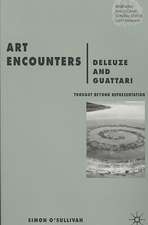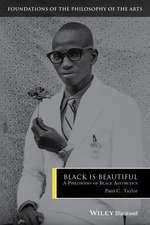The Aesthetico-Political: The Question of Democracy in Merleau-Ponty, Arendt, and Rancière
Autor Dr. Martín Ploten Limba Engleză Paperback – iun 2016
| Toate formatele și edițiile | Preț | Express |
|---|---|---|
| Paperback (1) | 255.19 lei 6-8 săpt. | |
| Bloomsbury Publishing – iun 2016 | 255.19 lei 6-8 săpt. | |
| Hardback (1) | 830.20 lei 6-8 săpt. | |
| Bloomsbury Publishing – 17 dec 2014 | 830.20 lei 6-8 săpt. |
Preț: 255.19 lei
Preț vechi: 294.19 lei
-13% Nou
Puncte Express: 383
Preț estimativ în valută:
48.83€ • 50.98$ • 40.41£
48.83€ • 50.98$ • 40.41£
Carte tipărită la comandă
Livrare economică 05-19 aprilie
Preluare comenzi: 021 569.72.76
Specificații
ISBN-13: 9781501319648
ISBN-10: 1501319647
Pagini: 184
Dimensiuni: 152 x 229 x 10 mm
Greutate: 0.25 kg
Ediția:NIPPOD
Editura: Bloomsbury Publishing
Colecția Bloomsbury Academic
Locul publicării:New York, United States
ISBN-10: 1501319647
Pagini: 184
Dimensiuni: 152 x 229 x 10 mm
Greutate: 0.25 kg
Ediția:NIPPOD
Editura: Bloomsbury Publishing
Colecția Bloomsbury Academic
Locul publicării:New York, United States
Caracteristici
Develops an aesthetico-political understanding of democracy through the works of Merleau-Ponty, Arendt, and Ranciere
Notă biografică
Martín Plot is Research Professor of Political Theory at the National Scientific and Technical Research Council (CONICET-IDAES/UNSAM, Argentina) and Research Fellow in Political Thought at the CalArts's Aesthetics and Politics Program. He is also the author of Indivisible (2011) and has edited, most recently, Claude Lefort. Thinker of the Political (2013.)
Cuprins
PrefaceAcknowledgementsIntroduction - The Advent of the Aesthetico-PoliticalThe Enigma of DemocracySchmitt, Lefort, and the Theologico-PoliticalThe Epistemological Regime of PoliticsConclusionChapter I - Our Element: Flesh and Democracy in Maurice Merleau-PontyDeus MortalisFlesh and DemocracyAn Entire PoliticsConclusionChapter II - The Law of the Earth: Hannah Arendt and the Aesthetic Regime of PoliticsDisagreement: Arendt and HabermasPolitical PhenomenologySpaces and Times of AppearanceConclusion: Political Kitsch and Ideology PoliticsChapter III - The (Re)Aestheticization of Politics: Jacques Rancière and the Question of DemocracyRancière, Lefort, and the PoliticalThe Question of Democracy-In AmericaRecapitulationBibliographic References
Recenzii
Martin Plot's Latin American background, his experience teaching theory to American art school students, and his firm grasp of debates in contemporary political thought are brought together in this sweeping vision of an 'aesthetico-political' theory. Plot argues that normative political theory needs to learn what he calls 'theorizing from events.' Using theory to go beyond theory, his approach recalls what Richard Armstrong, the director of the Guggenheim museum, recently called for: 'not looking at but engaging with' our times.
The political dimension of Merleau-Ponty's aesthetic and its implications for contemporary democratic thought have been little understood. Not only does Plot's improvisation on Merleau-Ponty's radical notion of the flesh, as distinct from body, contribute to remedying that situation, it also explains its importance for radical thought that interrogates the relation between modernity, the political and democracy. Through a 'coherent deformation' Plot's book establishes the basis of the problematic of radical democracy and demonstrates its limits.
Just when one begins to think that there is not much new that can be said of the democratic insights at work in the thinking of Merleau-Ponty, Arendt, Lefort, and Ranciere, along comes Plot's original, insightful, and nuanced reading of these thinkers. Critical of democracy, but not dismissive of it, Plot provides a provocative, thoughtful, and extensive argument for democracy's reliance on an aesthetic dimension. This is an indispensable book for anyone working on the question of democracy today.
The political dimension of Merleau-Ponty's aesthetic and its implications for contemporary democratic thought have been little understood. Not only does Plot's improvisation on Merleau-Ponty's radical notion of the flesh, as distinct from body, contribute to remedying that situation, it also explains its importance for radical thought that interrogates the relation between modernity, the political and democracy. Through a 'coherent deformation' Plot's book establishes the basis of the problematic of radical democracy and demonstrates its limits.
Just when one begins to think that there is not much new that can be said of the democratic insights at work in the thinking of Merleau-Ponty, Arendt, Lefort, and Ranciere, along comes Plot's original, insightful, and nuanced reading of these thinkers. Critical of democracy, but not dismissive of it, Plot provides a provocative, thoughtful, and extensive argument for democracy's reliance on an aesthetic dimension. This is an indispensable book for anyone working on the question of democracy today.
